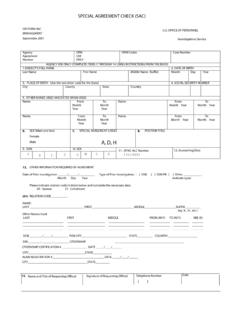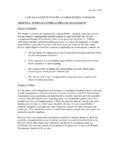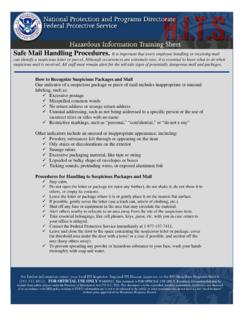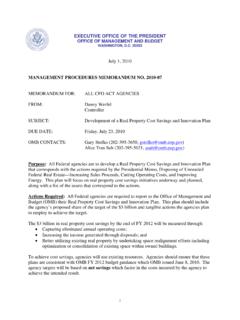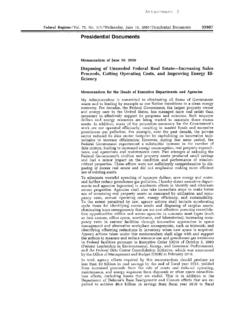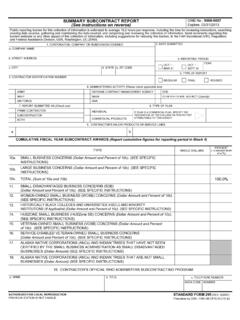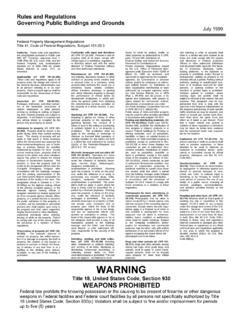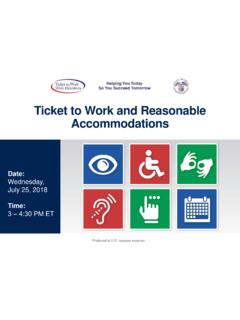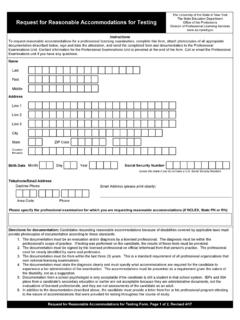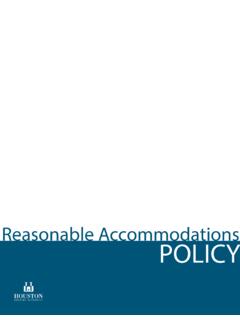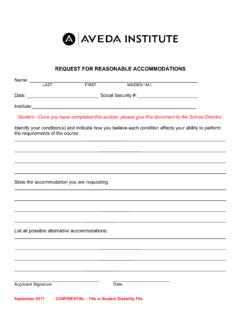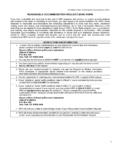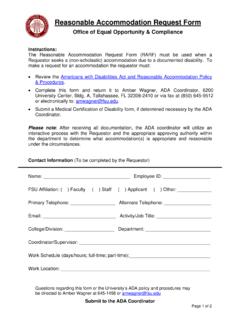Transcription of Employees’ Practical Guide to Requesting and Negotiating ...
1 Employees Practical Guide to Requesting and Negotiating reasonable Accommodations under the Americans with Disabilities Act accommodation and Com pliance Series Preface The Job accommodation Network (JAN) is a service of the Office of Disability Employment Policy of the Department of Labor. JAN makes documents available with the understanding that the information be used solely for educational purposes. The information is not intended to be legal or medical advice. If legal or medical advice is needed, appropriate legal or medical services should be contacted. JAN does not endorse or recommend any products or services mentioned in this publication.
2 Although every effort is made to update resources, JAN encourages contacting product manufacturers/vendors and service providers directly to ensure that they meet the intended purposes. This guarantees that the most up-to-date information is obtained. The following document is not copyrighted and reproduction is encouraged. Section 105 of the Copyright Law provides that no copyright protection is available for works created by the Government. Therefore, all works created by JAN fall under this provision. While individuals may use such work with impunity, individuals may not claim copyright in the original government work, only in the original material added.
3 Individuals may access the full text of the law from the Copyright Office Please note that specific information cited by JAN may be copyrighted from other sources. Citing secondary sources from a JAN publication may violate another organization's or individual's copyright. Permission must be obtained from these sources on a case-by-case basis. When using JAN materials, JAN asks that the materials not be reproduced for profit, that the tone and substance of the information are not altered, and that proper credit is given to JAN as the source of the information. For further information regarding this or any other document provided by JAN, please contact JAN.
4 Practical Solutions Workplace Success 2 EMPLOYEES Practical Guide TO Requesting AND Negotiating reasonable ACCOMMODATIONS under THE AMERICANS WITH DISABILITIES ACT Introduction The Job accommodation Network (JAN) is a free service of the Department of Labor s Office of Disability Employment Policy. JAN consultants have been providing job accommodation information since 1983 when JAN was founded. In addition, JAN consultants have been providing information about the Americans with Disabilities Act (ADA) since 1992 when the ADA went into effect. Over the years, JAN consultants have developed Practical ideas to help employees understand the ADA and request and negotiate reasonable accommodations in the workplace.
5 The Employees Practical Guide to Requesting and Negotiating reasonable Accommodations under the Americans with Disabilities Act is a summary of some of the most frequent issues that employees have regarding accommodations and the ADA and JAN s Practical ideas for resolving them. As new information is available or new issues develop, the Guide will be updated to reflect the changes. If you have an issue that is not addressed in the Guide or if you want to discuss an issue in more detail, please call JAN. Practical Solutions Workplace Success 3 TABLE OF CONTENTS I. ADA BASICS What is the ADA? Does my employer have to comply with Title I of the ADA?
6 How do I know if I have rights under Title I of the ADA? Where can I get more information about the ADA? II. Requesting AN accommodation How do I know when to request an accommodation ? How do I request an accommodation ? Do I have to tell my employer that I have a disability? How much medical information do I have to provide to my employer? What accommodations can I request? How long does my employer have to respond to my accommodation request? III. Negotiating AN accommodation How do I know if I am entitled to the accommodation I want? What if I am not sure what accommodation I need? What if my employer denies my accommodation request? What if I need another accommodation in the future?
7 What if my employer retaliates against me for Requesting an accommodation ? Practical Solutions Workplace Success 4 I. ADA BASICS What is the ADA? The ADA is a federal civil rights law that was passed in 1990 and went into effect beginning in 1992. Its purpose is to protect people with disabilities from discrimination in employment (Title I), in the programs and activities offered by state and local governments (Title II), and in accessing the goods and services offered in places like stores, hotels, restaurants, football stadiums, doctors offices, beauty parlors, and so on (Title III). The focus of this Guide is Title I of the ADA, which prohibits discrimination in employment and requires employers to provide reasonable accommodations for employees with disabilities.
8 Does my employer have to comply with Title I of the ADA? Only covered entities must comply with Title I of the ADA. The term covered entities includes private employers with 15 or more employees, employment agencies, labor organizations, and joint labor-management committees. State and local government employers must also comply with the ADA. Federal executive agencies are exempt from the ADA, but they have to comply with the Rehabilitation Act of 1973, which is almost identical to the ADA. How do I know if I have rights under Title I of the ADA? Sometimes it is difficult to determine whether you have rights under Title I of the ADA, but understanding some of the terms used in the ADA may help you make that determination.
9 In general, Title I protects qualified employees with disabilities. The term qualified means that you satisfy the skill, experience, education, and other job-related requirements of the position sought or held, and can perform the essential job functions of the position, with or without reasonable accommodation . For additional information about the definition of qualified, see #II. The term employee means, "an individual employed by an employer." The question of whether an employer-employee relationship exists depends on whether the employer controls the means and manner of the worker's work performance. For additional information about the definition of employee, see #2-III-A-1.
10 The term disability is defined in general terms rather than with a list of medical conditions. The definition of disability includes: (1) a person who has a physical or mental impairment that substantially limits one or more major life activities, (2) a person Practical Solutions Workplace Success 5 with a record of a physical or mental impairment that substantially limits one or more major life activities, and (3) a person who is regarded as having a physical or mental impairment that substantially limits one or more major life activities. Therefore, to determine whether you have a disability, you must first determine two things: 1. Whether you have an impairment, and 2.
